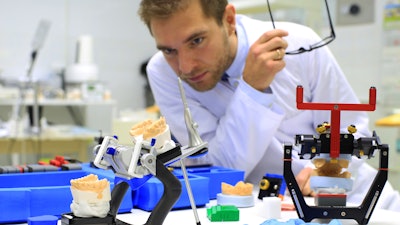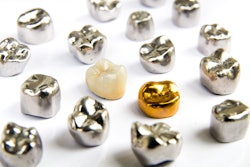
Lab-fabricated, implant-supported, all-ceramic crowns may have a significantly lower failure rate than prosthetics made by the chairside method, according to a study recently published in Dental Materials.
Furthermore, lab-fabricated crowns had a failure rate 26 times lower than chairside ones, with high success rates observed for CAD-CAM implant-supported ceramic crowns, the authors wrote.
"For CAD-CAM manufactured implant supported all-ceramic crowns, high success rates were found in up to 12-year evaluation," wrote the authors, led by R.J. Wierichs of the University of Bern School of Dental Medicine in Switzerland (Dent Mater, September 24, 2024).
The prospective, noninterventional, multicenter study analyzed data from 567 patients with CAD-CAM implant-supported ceramic crowns placed between 2008 and 2023 and evaluated by 54 dentists. A total of 907 crowns with at least one follow-up were included, with 151 crowns followed for five years or more, including all failures.
Crowns were deemed successful if they remained functional without additional therapy. Multilevel Cox proportional hazard models were used to assess predictors and success over time, according to the study.
At the end of a mean follow-up period of 2.5 years, 97% of crowns were successful, with an overall annual failure rate of 0.74%. In the five-year scenario, the success rate dropped to 72%, with an annual failure rate of 3.3%. Failure types included decementation (n=11), ceramic fractures (n=4), TiBase fractures (n=4), and implant removal (n=2).
Crowns in the lower arch had a three times lower risk of failure than those in the upper arch, and conventionally or adhesively cemented crowns had a significantly lower risk than screw-retained crowns. In the five-year scenario, lab-fabricated crowns had a 26 times lower failure rate than chairside ones, while using silane or etching increased the risk of failure, according to the results.
The study had limitations. Since it was an observational study, the treatments provided and recorded were not standardized before the investigation began, the authors wrote.
"CAD-CAM manufactured all-ceramic implant supported single-unit crowns showed high success rates after up to 12 years in private practice environment," they concluded.




















